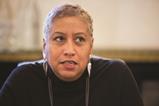Seen as ’outsiders’, overseas and BAME doctors are disproportionately referred to GMC and lack support, note Doyin Atewologun and Roger Kline
Without the contribution of overseas doctors, nurses, midwives, allied health professions and other staff, the NHS would collapse.
It would seem a matter of self-interest to ensure such staff are welcomed, well treated, given support with consideration given to the need to treat them as “one of us” not as “outsiders” since we know that staff who are well treated in an inclusive environment are likely to provide better, safer care.
Our recent research for the General Medical Council explored why, between 2012 and 2017, it was much more likely that black, Asian and minority ethnic doctors would be referred to the GMC by their employers, compared to white doctors; and why in the same period, compared to UK graduates, non-UK graduates were referred at two-and-a-half times the rate of UK graduate doctors.
Events such as the case of Dr Bawa Garba have highlighted the importance of understanding such trends in both secondary care and in primary care.
Our key finding after talking extensively to doctors, managers, and HR leaders, including visits to 15 NHS employers was that these disproportionate referrals to fitness to practise processes were explained by some groups of doctors being seen as “outsiders” in secondary care, particular overseas trained doctors, locums, older overseas trained primary care doctors especially in challenging environments and SAS (specialist and associate specialty) doctors were more likely to be referred. We found that such doctors:
- Often do not have adequate ongoing induction or support following their transition to new social, cultural and professional environments. Often, whilst clinical skills were assured, approaches to concepts such as consent, confidentiality, and end of life care might be different, and how clinics or multidisciplinary teams are run might be very different to their country of origin
- Do not always receive effective, honest or timely feedback which could prevent problems later. This is partly because some clinical and non-clinical managers avoid difficult conversations, particularly where they are from a different ethnic group to the doctor, and may be more likely to consider formal investigations early. Once a formal investigation commences, there is a risk of confirmation bias. Once an allegation is made, how insight is demonstrated may be different to what’s expected by managers
- Many work in isolated roles lacking exposure to formal and informal learning experiences, mentors and resources
- Are treated as “outsiders”, who are less favoured than “insiders” who experience greater workplace privileges such as prompt and direct feedback, benefit of the doubt and social support.
The risk of being referred is compounded:
- Where leadership teams are remote and inaccessible because then doctors struggle to approach them for advice and support, and may not be listened to and divisive cultures can develop
- Where there is a focus on who to blame when things go wrong, rather than what needs to be learnt from an incident
We found that the same workplace factors that created greater risk for doctors who qualified overseas, many of the BAME doctors also, at the same time, provided a level of protection for their UK-trained and non-BAME colleagues where alleged shortcomings might be dealt with informally or where such staff knew better how to “navigate” the system.
In secondary care we deliberately visited NHS employers that we believed might demonstrate better practice and our recommendations are based largely on examples of good practice we found. We recommended:
- Better, ongoing support for doctors new to the UK or the NHS or whose role is likely to isolate them (such as SAS doctors and locums)
- That it was vital that the systemic issues, that prevent a focus on learning rather than blame when something goes wrong, must be addressed.
- Engaged, positive, proactive and inclusive leadership of doctors must be more consistent across the NHS.
- There must be UK-wide mechanisms to ensure delivery of the recommendations.
Although the environment in which GPs practice is different our recommendations in respect of primary care recognise that older overseas trained primary care doctors often work in challenging environments which may leave them isolated.
Our recommendations, which will also insert greater accountability into the process of referral, draw on a wider literature about supporting doctors, a learning culture, and employer strategies that are proactive and preventative rather than reactive. Many of our recommendations are based on examples of good practice we saw.
Feedback so far suggests a determination by the GMC and others to implement the recommendations. We are optimistic that these actions will not only benefit overseas trained and doctors and other “outsiders” but should make a small contribution to making the NHS a fairer and more supportive environment with greater emphasis on learning and not blame.































1 Readers' comment